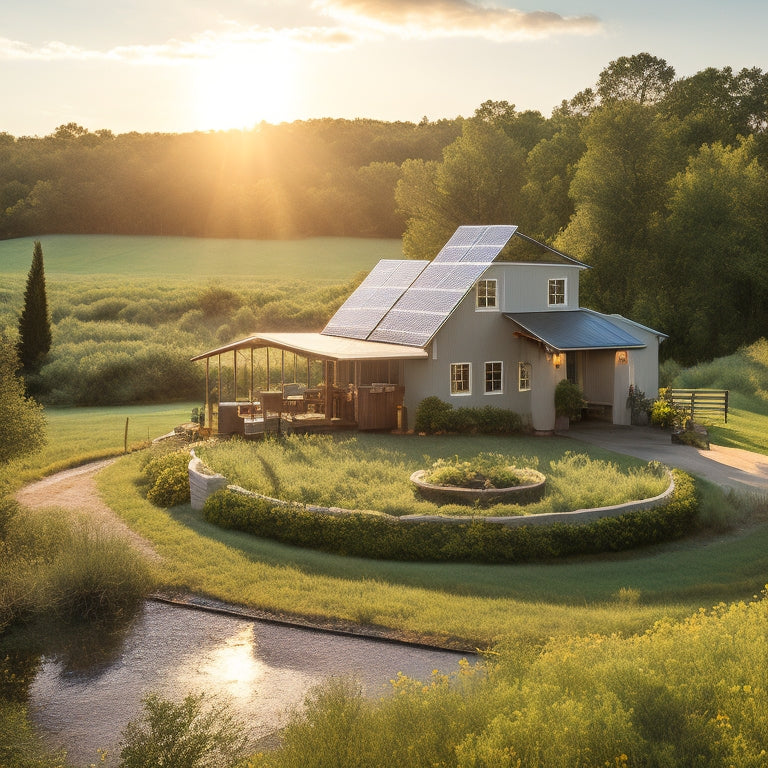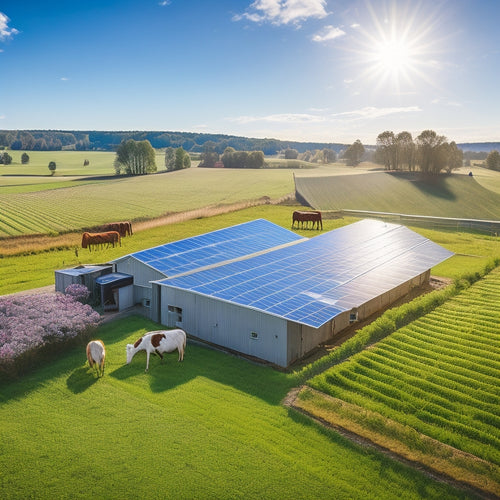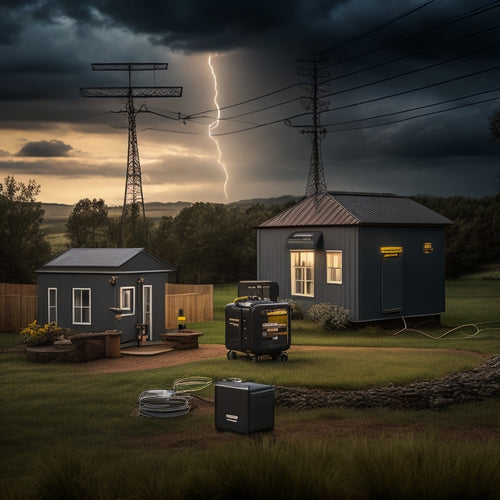
Empower Your Home With Off-Grid Freedom
Share
By shifting to an off-grid energy system, you reveal a self-sufficient lifestyle that breaks free from reliance on public utilities, reducing your environmental footprint and energy costs while increasing your peace of mind. You'll enjoy energy independence, cost savings, and a strengthened community resilience. With the right solar components, energy storage, and inverters, you can design a system customized to your needs. From choosing efficient solar panels to maintaining your system, every decision counts. As you investigate the possibilities of off-grid living, you'll uncover the keys to a more sustainable, flexible, and resilient lifestyle, and learn how to optimize your system for maximum freedom.
Key Takeaways
- Achieve energy independence and reduce reliance on public utilities with off-grid energy systems.
- Minimize environmental footprint by harnessing renewable energy sources and promoting eco-friendly choices.
- Cost savings from reduced energy bills, lower operational costs, and potential tax credits and incentives offset initial investment.
- Enhance lifestyle flexibility with sustainable living and emergency preparedness, increasing property value through sustainable upgrades.
- Ensure system longevity and optimal energy production through regular monitoring, maintenance, and troubleshooting.
Benefits of Off-Grid Energy
Embracing off-grid energy enables you to break free from the constraints of traditional power grids, unfastening a multitude of benefits that change your life.
You'll enjoy energy independence, reducing your reliance on public utilities and gaining control over your power supply. Off-grid energy also minimizes your environmental impact, allowing you to make eco-friendly choices that align with your values.
By adopting decentralized energy generation, you'll strengthen community resilience community empowerment and support socioeconomic development. In addition, you'll reap cost savings from reduced energy bills and increased grid resilience.
This lifestyle flexibility enables you to live sustainably, prepare for emergencies, and stay connected with your community. Moreover, you'll benefit from technological advancements that continually improve off-grid energy systems.
Choosing the Right Solar Panels
As you've taken the first step towards off-grid energy independence, it's time to focus on the heart of your system: solar panels.
You'll want to choose panels that maximize energy production while minimizing space and cost. Panel efficiency, a measure of how much sunlight is converted into electricity, is vital. Look for high-efficiency panels (above 20%) to get the most bang for your buck.
When selecting solar panels, it's important to take into account certifications from UL or IEC to guarantee durability and consistent power output. Additionally, harsh weather resistance is a significant factor in brand selection.
Imagine utilizing the power of the sun to fuel your daily life, free from reliance on the grid. Visualize the sense of security that comes with knowing you're generating your own clean energy.
Envision the satisfaction of being an off-grid pioneer, blazing a trail towards a sustainable future. Opt for advanced solar technology to guarantee your system remains efficient and effective for years to come.
Building Your DIY Solar Kit
You've selected your solar panels, now it's time to assemble your DIY solar kit. This involves connecting the solar panels to the charge controller, inverter, and mounting system.
Verify all solar kit components are compatible and sized correctly for peak energy efficiency. When assembling, follow the manufacturer's instructions and take necessary safety precautions.
Consider the energy storage needs and potential for system expansion when planning, as this will guarantee a reliable power supply Energy Efficiency Measures.
Additionally, keep in mind that regular maintenance, such as cleaning your panels every 6-12 months, is essential to maintain peak performance.
Energy efficiency tips include orienting your panels towards the south, angling them at 30-40 degrees, and keeping them clean.
Properly securing your panels to the mounting system is vital to withstand environmental elements.
Selecting Deep Cycle Batteries
Your off-grid energy system's heart is the deep cycle battery bank, where excess energy generated by your solar panels is stored for later use.
When selecting deep cycle batteries, you'll want to evaluate factors that impact their performance and lifespan. Look for batteries with a high depth of discharge (DOD) rating, as this indicates how much of the battery's capacity can be safely used before recharging.
-
A longer battery lifespan means fewer replacements and lower costs over time.
-
Proper maintenance tips, such as regular equalization and watering, can extend the life of your batteries.
-
Choosing the right battery type, such as flooded, AGM, or lithium-ion, depends on your specific off-grid energy needs and preferences.
Inverter and Charge Controller Needs
When configuring your off-grid system, you'll need to take into account inverter and charge controller needs that align with your specific energy requirements.
You must determine the ideal system configuration options, power output capacity, and energy storage needs to guarantee seamless integration and efficient energy flow.
System Configuration Options
Freedom from the grid's constraints begins with a customized system configuration, where every component plays an essential role in utilizing and managing renewable energy.
You'll need to determine the right inverter and charge controller for your off-grid system, considering factors like system scalability options and grid backup solutions.
-
Imagine having the flexibility to add or remove components as your energy needs change
-
Visualize a seamless shift between grid power and renewable energy with advanced grid backup solutions
-
Envision a system that can grow with you, adapting to your developing energy requirements
Power Output Capacity
As you design your off-grid system, the power output capacity of your inverter and charge controller becomes a critical consideration.
These components must be able to handle the power generation from your renewable energy sources, such as solar or wind power, and manage the electrical load of your home. The inverter converts DC power from your renewable sources to AC power for your home, while the charge controller regulates the flow of energy to your batteries.
You'll need to determine the maximum power output required to meet your energy needs, considering factors like appliance wattage and usage patterns. Proper load management is essential to guarantee your system can handle peak demand and prevent overload or brownouts.
Energy Storage Needs
During periods of low energy production, your off-grid system relies on energy storage to meet your power needs.
This is where your inverter and charge controller come into play. They work together to guarantee energy efficiency and optimize the performance of your renewable resources.
-
Imagine having a reliable source of power, even when the sun isn't shining or the wind isn't blowing.
-
Visualize your home running smoothly, without interruptions, thanks to your energy storage system.
-
Envision the peace of mind that comes with knowing you're in control of your energy needs, no matter what Mother Nature has in store.
Mounting and Installation Tips
When selecting a mounting location for your off-grid system, consider the structural integrity of the surface you're attaching to, as well as any potential obstructions or hazards.
Make sure the surface can support the weight of your system and withstand environmental factors like wind and weather. You'll also want to choose a location that allows for easy access and maintenance.
Proper mounting techniques are essential for installation safety. Use sturdy mounting hardware and follow the manufacturer's instructions to avoid damage or injury.
Additionally, consider hiring a professional if you're not experienced with installation or feel uncertain about any aspect of the process.
Monitoring and Maintenance Essentials
Your off-grid system's performance relies heavily on regular monitoring and maintenance to ascertain ideal energy production and longevity.
You must stay on top of your system's operation to make sure it's running efficiently and effectively. This includes routine maintenance tasks like cleaning panels and inverters, inspecting cables and connections, and troubleshooting issues promptly.
- You'll avoid costly repairs and replacements by catching potential problems early on.
- Proper maintenance will extend the lifespan of your system, saving you money in the long run.
- With regular system monitoring, you'll have peace of mind knowing your energy needs are being met reliably.
Frequently Asked Questions
Can I Still Use My Existing Electrical Appliances With Off-Grid Energy?
You can use your existing electrical appliances with off-grid energy, but you'll need to take into account appliance compatibility and energy efficiency to guarantee they work seamlessly with your new power source.
How Do I Ensure My Off-Grid System Is Safe From Power Surges?
Did you know 60% of power surges originate from within your home? To guarantee your off-grid system's safety, you'll need to install surge protection devices and guarantee proper system grounding to prevent electrical shocks and equipment damage.
Can I Add More Solar Panels to My System in the Future?
You can easily expand your solar panel array in the future to meet growing energy needs, as long as your system's inverter and charge controller are designed to accommodate solar panel expansion and can handle increased energy output.
Will My Off-Grid System Work During a Grid Power Outage?
During a grid power outage, your off-grid system will seamlessly switch to battery storage, ensuring you maintain energy independence and uninterrupted power supply, as long as your system is properly sized and installed.
Do I Need to Notify My Utility Company About My Off-Grid System?
You'll likely need to notify your utility company about your off-grid system, as utility regulations vary, and you may be eligible for net metering, which allows you to sell excess energy back to the grid.
Related Posts
-

What Do I Need to Know About Farm Solar Panels
When considering farm solar panels, you need to assess costs, benefits, and technical specifics. Initial investment c...
-

Key Components of a Reliable Emergency Power Supply System
A reliable emergency power supply system requires several key components. You need proven performance metrics to guar...
-

Solar Powered Lights for Sustainable Home Decor
Solar-powered lights offer a stylish and eco-friendly way to enhance your home decor. They capture sunlight, converti...


